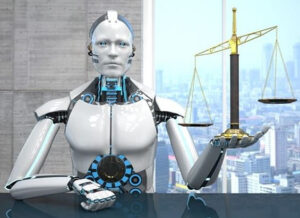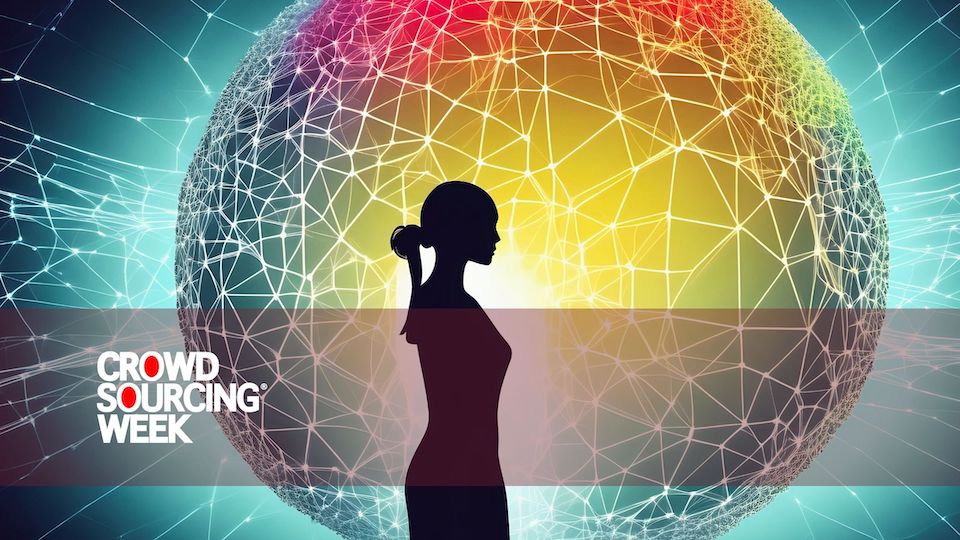In January 2024 we were excited to announce this year’s theme “The Age of HI + AI” which will see the fusion of human intelligence with machine capabilities, propelling us into new frontiers of collective intelligence. This Crowdsourcing Week blog takes a look at real-world applications where AI + HI are reshaping industries, from healthcare and legal services to finance and heavy industry, to discover how their fusion is enhancing decision-making, and driving efficiency.
Healthcare
Current shortages in many countries of clinicians and medical staff of all kinds provide the pain point for AI to be a healthcare solution. However, healthcare is generally perceived as intrinsically “human,” and few healthcare occupations consist wholly of automatable tasks. Nevertheless, many cases of automation and AI in healthcare will enable staff to switch their time and attention to tasks that cannot be automated, and to focus on activities where humans can add more value. Where is the line to be drawn in this division of labor?
Undoubted improvement in efficiency
A natural language processing tool can analyze 6,000 patient feedback comments in 15 minutes, compared to four days for a member of staff. However, this is a back office role and out of sight from patients, which makes it easier to introduce. Whilst robots may be perfectly capable of front-line roles such as delivering medicine, explaining examination results, and even carrying out surgery, there are inevitably going to be gaps in trust. There are other tasks requiring traits or competencies that AI and other technologies currently struggle to replicate.
Public reaction
Understanding how the public feels about digital health technologies and data use is crucial to the successful rollout of AI-driven medtech. UK research shows women and those most likely to be on low or no income are significantly less positive about the use of healthcare technology than men or those more likely to be on higher incomes.
Better off, more affluent people are most likely to adopt self-monitoring through wearable technology. Their personal data is continually adding to healthcare collective intelligence and improved predictive analysis.
Role of health sector stakeholders
Overall, effective transformation and a fusion of HI with AI requires a collective view of what healthcare and role evolution could and should look like in the future. It will require a collaborative shared vision between stakeholders including clinicians, employers (which could be the government), trade unions, professional and employee representative bodies, patients, and the public (particularly if the health service is paid for through general taxation). The alternative is to sit back passively, and irresponsibly, and wait to see where commercial decision-making on AI applications leads us.
Legal services

Image source: zmuth.com
AI is unlikely to replace lawyers entirely in the foreseeable future. However, it is sure to transform the way legal services are delivered. Here are some likely major impacts on the legal services sector from the introduction of artificial intelligence.
Increased Efficiency and Productivity
AI applications can automate many repetitive and time-consuming tasks currently handled by lawyers, such as legal research, document review, due diligence and contract analysis. This could lead to a decrease in demand for paralegals and associates who primarily handle these functions.
Who needs expensive lawyers doing weeks of research if GenAI can give results in a few minutes? At the same time, though, it releases people to focus on more strategic and complex legal issues, improving overall efficiency and productivity.
Increased Demand for Specialized Lawyers and AI Management Skills
As AI handles routine tasks, lawyers will need to focus on higher-level strategic thinking, complex legal issues, and client relationship management. This could lead to a rise in demand for lawyers with specialized skills and experience.
Also, many people are learning that AI cannot be trusted completely. Implementing, maintaining, and overseeing AI tools will require new legal professionals with expertise in AI and data analysis.
However, it does beg the question that if AI handles significantly more of the legal profession’s entry-level work, how will the specialists and sector leaders of the future learn their knowledge and gain their skills if the traditional training is replaced by AI?
Enhanced Access to Justice
AI-powered tools can potentially make legal services more affordable and accessible to the public. For instance, AI can help with tasks like generating basic legal documents or providing initial legal advice, which can be particularly helpful for low-income individuals and those in remote areas.
Improved Decision-Making
AI can analyze vast amounts of legal data to identify patterns and predict the outcomes of cases. This can be a valuable tool for lawyers when making strategic decisions about litigation or settlements.
With AI handling much more of the analytical side, lawyers will need to excel in communication, critical thinking, negotiation, and client service to remain valuable.
Overall Impact
The jury’s still out on the net effect of AI applications on legal jobs. Some predict a decrease, while others believe AI will create new opportunities. It’s likely to be a transformation, not a complete replacement. Lawyers who can adapt their skill sets and embrace AI as a tool will be best positioned to thrive in the evolving legal landscape.
Financial services
The financial services sector has a high exposure to AI disruption, ranking third after tech, media and telecoms, and healthcare. Whilst current LLMs may not be able to completely automate analysis, their ability to understand large quantities of data almost instantly may make them a useful tool for analysts in the future.
Here are some likely major impacts of artificial intelligence on the provision of financial services.
Democratization of Finance
AI can make financial services more accessible and inclusive. Robo-advisors powered by AI can provide basic investment advice and portfolio management at a lower cost than traditional human advisors. This opens up investment opportunities to people who might not have been able to afford them before.
AI can analyze financial data to automate loan approvals, making the process faster and potentially growing the market by opening doors for people with non-traditional credit histories.
Enhanced Risk Management and Fraud Detection
AI excels at analyzing vast amounts of data to identify patterns and trends. This can significantly improve financial institutions’ ability to assess credit risk by analyzing a wider range of data points to create more accurate borrower profiles, leading to better loan decisions and reduced defaults.
AI can also continuously monitor transactions for suspicious activity, helping to prevent fraud and identity theft.
Hyper-Personalized Financial Experiences
AI applications can personalize financial services to a much greater degree, leading to a more convenient and efficient experience for customers. AI-powered tools can analyze personal spending habits, for example, and automatically allocate funds. This helps users save and budget more effectively.
AI-powered chatbots and virtual assistants can provide 24/7 customer support, answer basic questions, and even offer personalized financial recommendations.
Impact on Employees
Many repetitive back-office and data processing roles could be automated by AI, including tasks like loan processing, data entry, and fraud analysis. This could lead to job losses in these areas.
Customer-facing roles in retail banking, already hit by branch closures as more people come to rely on online banking, are also under threat. As AI-powered chatbots and virtual assistants become more sophisticated, they may handle a significant portion of basic customer service inquiries, potentially reducing the need for human representatives.
More senior roles in consultancy and accountancy firms and investment banking are also being slashed, though that can be just as much down to over-zealous recruiting in the immediate post-pandemic period, and a response to the decreased levels of IPOs, and merger and acquisition activities. Perhaps the big question is when the work returns, will the finance firms hire more people or invest in AI?
Heavy industry
As an example of HI and AI applications, steel manufacturers are turning to AI as they strive to optimize operations, improve safety and reduce costs. A Boston Consulting Group study published in 2021 found that by connecting production assets to deliver collective intelligence through data delivered by smart sensors, and by generating insights to change processing instructions and raw material input mixes, companies could achieve significant results.
- Reduce raw material input costs by more than 5%
- Improve throughput at bottlenecks by more than 6%
- Increase end-to-end product yields by more than 15%

Melting scrap iron. Image source: Photo by yasin hemmati on Unsplash
However, the UK is on the verge of becoming the first G20 country to close its entire blast furnace capacity to make raw steel from scratch, and rely on making steel from recycled material in new, and far more automated electric arc furnaces. It will be at the cost of over 90% of the current 3,000 jobs. Their loss will devastate local communities whose entire economic ecosystems depend on those jobs, both financially and spiritually.
This brings us to wider ethical and societal implications of AI and HI than production and efficiency. We will consider this aspect of fusing AI with HI later in the year.
Do you work with AI in any of these industry sectors, or in any others? Please share your observations and opinions with us.




0 Comments